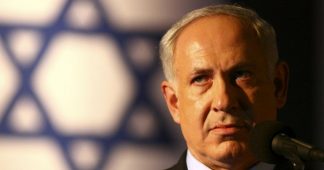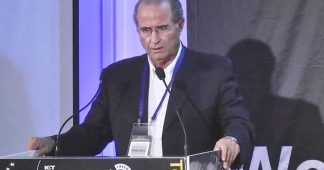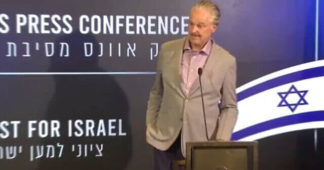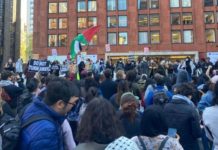In an unusual step, opposition leader Benjamin Netanyahu declined to attend the state memorial ceremony marking 26 years since the assassination of Prime Minister Yitzhak Rabin.
By Mazal Mualem
Oct. 19, 2021
Marking 26 years after the assassination of Prime Minister Yitzhak Rabin, Israel held a series of events in his memory Oct. 18. There was an annual commemoration ceremony at the Mount Herzl National Cemetery, and the traditional special Knesset session dedicated to Rabin. Shortly before the ceremony at the cemetery, opposition head Benjamin Netanyahu’s office said he would not attend.
Netanyahu’s unusual decision not to participate in the memorial service set off a storm of responses from the Israeli left. It was yet another round of a fight that had been waged in Israel since that terrible night 26 years ago.
At the time of the assassination, Netanyahu was also chairman of the opposition. He headed an angry and belligerent right that fought a devastating battle, both publicly and politically, against the Oslo Accords signed by Rabin with Palestinian leader Yasser Arafat. Those agreements were supposed to lay the groundwork for the creation of a Palestinian state.
At the time, Netanyahu argued that the Oslo Accords would go down in history as a terrible mistake and that they would only intensify Palestinian terrorism. At the time there was a series of brazen attacks in Israel’s major cities. Netanyahu opposed Rabin, demonstrating against the accords and speaking out against the agreement.
Those were very volatile days in Israel. On the night of Nov. 4, 1995 (Israel commemorates the Hebrew calendar date), it all blew up when a right-wing Jewish extremist fired the three shots that brought the debate to its tragic climax.
The political assassination of Rabin by Yigal Amir was intended to stop the Oslo Accords from being implemented. Since that night, the left has pointed accusingly at Netanyahu, claiming that he was responsible for the incitement that led to the assassination. At the time, Netanyahu was expected to defeat Rabin in the elections scheduled to take place a year later, but his support suddenly crashed.
Even within the Likud party that he headed, there were those who believed that his political career had come to an abrupt end. But just eight months later, Netanyahu defeated Rabin’s heir Shimon Peres in a mortal blow to Israel’s left.
The events formed the overarching foundation story of Israeli society and politics for the last 26 years. It has been a full generation — and almost a third of Israel’s history — since the assassination shaped the public discourse in Israel, and to a large degree, the character of Netanyahu. He not only politically recovered from the night, but became Israel’s longest serving prime minister, with a total of 15 years in office.
In all those years, Netanyahu claimed that he was waging a legitimate political battle. At no point did the assassin represent the right, Netanyahu claims, having acted alone. In contrast, Rabin’s family and the left as a whole believe that Netanyahu was a central figure in creating the atmosphere that led to the assassination. Once Netanyahu was elected, these accusations toned down considerably. Now that Netanyahu is off the political stage, they are beginning to be heard again, with even greater intensity.
This background is necessary to understand the impassioned political battle that took place in Israel yesterday. Netanyahu, who turns 72 next week, is once again the battered leader of the opposition. And once again, the children and grandchildren of Rabin, along with the Israeli left led by Foreign Minister Yair Lapid, are lashing out at him yet again, claiming that he hadn’t learned from what happened.
As any Israeli who followed yesterday’s memorial services and was an adult at the time of the murder would agree, it didn’t seem like 26 years had passed. The debate has barely died down.
After the new government headed by Prime Minister Naftali Bennett and his senior partner Lapid was formed, Netanyahu made two strategic decisions: He would stay on as leader of the opposition, laying the groundwork for a return to power, and he would portray Bennett as an illegitimate prime minister, pointing out that his party, Yamina, had barely won six seats. He consistently avoids referring to Bennett as prime minister, or even mentioning him at all. As a result, Netanyahu is often accused of following a dangerous strategy that could end in yet another political assassination. When Netanyahu decided to stay away from the state memorial service, which was attended by Bennett, the president and Rabin’s family, he was said to be refusing to fulfill his role as a representative of the state and even accused of incitement.
Rabin’s grandson, Yonatan Ben Artzi, who was a soldier at the time of his grandfather’s assassination, delivered a speech at another ceremony honoring Rabin, this one at the president’s residence. He said, “The rule of the people has triumphed over the rule of one. It is thanks to this victory, achieved 26 years after that horrendous night, that I can look you in the eye … and say: Mourning time is over. Let us learn from our past and embark on a new road.”
There was no question who he was referring to. Netanyahu’s response, sent by way of a Likud spokesperson, challenged Ben Artzi’s thesis. “The rule of the people triumphed over the rule of the individual? It’s exactly the opposite. It’s the individual who defrauded the nation to steal power.”
A few hours later, Netanyahu himself delivered a speech at the Knesset as leader of the opposition. It may have been the first time that he has ever personally given his version of what happened on the night of the murder. He seemed uninhibited, thanks in no small part to Ben Artzi’s remarks.
“For 26 years, there have been those who have used the Rabin assassination to stain a large sector of the nation, the right that I am proud to represent and me personally. The time has come to stop preaching to us.” Netanyahu said that despite the hostility against him, he had fulfilled his duty over the years in attending memorial events as prime minister in accordance with protocols. But each time, he was asked why he came. Now that he is no longer prime minister and no longer obligated to attend, those same people are asking why he didn’t.
In his address to the Knesset, Netanyahu also repeated his claim that Bennett is not a legitimate prime minister, as he brought into the coalition only six Knesset members. “The government is legitimate in every way, but there was someone who once said that forming a government with 10 seats is illegitimate and undemocratic,” he jabbed at Bennett, quoting accusations Bennett himself had leveled at Netanyahu years ago.
Clearly, Israeli society is a still long way from recovering from Rabin’s assassination.
Published at www.al-monitor.com
We remind our readers that publication of articles on our site does not mean that we agree with what is written. Our policy is to publish anything which we consider of interest, so as to assist our readers in forming their opinions. Sometimes we even publish articles with which we totally disagree, since we believe it is important for our readers to be informed on as wide a spectrum of views as possible.











